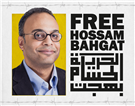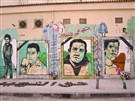Report shows press freedom violations today are a stronger and redirected version of Morsi’s policies.
In the lead up to the 30 June protests that eventually led to the ouster of former President Mohamed Morsi, the government issued warnings it would shut down private satellite channels and restart investigations into journalists, the Committee to Protect Journalists said in a report released last week.
“Within a week, those same sorts of measures would be turned against Morsi and the media that supported him,” the report said.
The twenty-page report “On the Divide: Press freedom at risk in Egypt,” published by the New York-based CPJ, said that the playbook used by Morsi was adopted from his military predecessors, and has since been used by the military-backed government that replaced him.
Under Morsi, the report said, nearly seventy articles in eight different laws restricted freedom of expression and the freedom of the press, in addition to other tactics, used to intimidate journalists. Those included charged rhetoric, what could have been coordinated violence against journalists while in the field, the threat of lawsuits, and allowing protestors aligned with Morsi to threaten journalists.
The report has a special focus on the killing of Al-Hosseiny Abou Deif, who investigators said was shot at from a close range after being singled out by a laser pointer. Abou Deif was allegedly showing protestors outside the presidential palace a video of Muslim Brotherhood supporters on the rampage when he was shot in the head in December 2011.
Since Morsi was ousted, the report said, press freedoms have further been reduced. Five pro-Morsi stations were shut down in an order that cited “exceptional measures” and a military spokesperson said it was due to incitement to violence. The administrative court has not replied to the complaints of three of the channels that challenged the order’s legality.
The report, which was published before this past weekend’s high-profile attacks on journalists, noted a trend in which local media and political parties have made it harder for the press to perform its job.
“It is almost impossible for the media to operate freely and present professional journalism as both religious and nationalist forces produce polarizing narratives that reject the other side and escalate divisions and potential for armed confrontations,” the editor in chief of Al-Shorouk, Emad Eddin Hussein, told the researchers.
The government’s response has been to appoint a High Council for Journalism, but the report`s authors assert that any state body would lack the appropriate independence to efficiently regulate the press while preserving freedoms.
Instead, the CPJ report gives twelve recommendations to Egyptian authorities, political parties, and news media, as well as the international community, which include legal reform and changing the discussion of the role of the press.
![[Media restrictions continue in Egypt. Image originally posted to she2i2.blogspot.com]](https://kms.jadaliyya.com/Images/357x383xo/ScreenShot2013-08-20at10.56.58AM.png)





